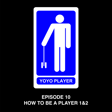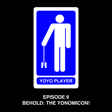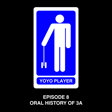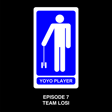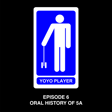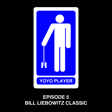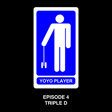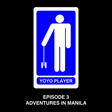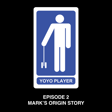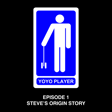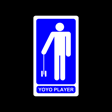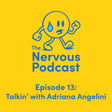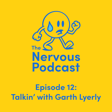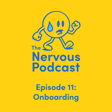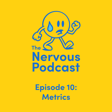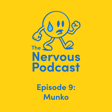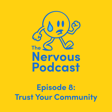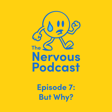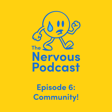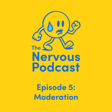Become a Creator today!Start creating today - Share your story with the world!
Start for free
00:00:00
00:00:01

Fiend Magazine
Mark & Steve dive into the history of Fiend Magazine, the first full-color magazine dedicated to yoyoing. It only lasted 4 issues (kinda) and died a glorious death.
This is the final episode of Season One! We'll be back in 2025 with Season Two.
This episode brought to you by YoYoExpert.com.
Recommended
Transcript
Introduction to the Yo-Yo Player Podcast
00:00:01
Speaker
I'm Steve Brown. And I'm Mark McBride. And this is the Yo-Yo Player Podcast, where two dusty old graybeards relive their glory days. And you have to listen to it.
00:00:30
Speaker
This is a pretty good episode, I think. This is gonna be a good one.
Podcast Delays and Popularity
00:00:34
Speaker
So let's let's preface this by saying the last episode that we recorded was pre World Yoyo Contest 2024. And the reason it's been so long since we've recorded one is because I was running the World Yoyo Contest 2024. And I have to say, I was really excited and pleasantly surprised at how many people came up to me to talk about the podcast at Worlds. Me too, me too. Like this was always something that there was like,
00:01:03
Speaker
Steve going like hey, we should record these before we're so old we forget it yeah, and I was like sure like four people will like listen to it and So it was super nice when five people came up to me and said really kind things I mean, and I do this with a lot of things, but this is very much one of those things that it's like, we're doing this for us. We're doing this for ourselves. And if anybody else is interested, like that's awesome and flattering. But realistically, you and I are the audience for this and, you know, a handful of fellow gray beards who were around for this stuff. And we're like, Oh dude, I forgot about that. That's hilarious. Oh yeah. No, totally. Totally. So I'm, I'm always very flattered and pleased when anybody else cares.
Introducing Fiend Magazine
00:01:41
Speaker
So this week, yeah, we are talking about Fiend magazine. Fiend magazine. Now this, this is a true relic of another time. So let's, uh, as we do, let's set our, set our context. So this is 1998, uh, earlier, actually the story might start earlier than 90 might start 97 nineties, you know,
00:02:10
Speaker
Is it? Let me see. Let me see if I can. i So I have... ah Issue one came out in 1998. I know that. Worlds, it was Nationals 98. Fall of 98 is the published date on the inside cover of issue one. Nice. Yeah. So as so many of these things do, we started in
Greg Cohen's Strategic Plans
00:02:30
Speaker
Tallahassee, Florida.
00:02:31
Speaker
yeah And you know basically, as the legend goes, which we said before on the podcast, that you know Greg Cohen saw the saw the boom coming. I think a lot of people did. like I didn't realize at the time it seemed magical, but yet after working in the toy industry, actually most industries, so many things are just broadcast yeah ahead of time. Well, by we had already seen the teal tide. you know what i mean like We had already had yeah
00:03:03
Speaker
um We had already had the 97 world yo-yo contest where THP showed up in force um You know and and we saw you saw like a little army of kids and like teal polo shirts playing two-handed You know what I mean? Like there was it was very clear to anybody who was paying attention that like something was happening here Yeah, and Greg was smart enough to say I'm gonna do the non yo-yo part of the yo-yo boom yeah like I know that Arnie Dixon ran off and started SuperYo to position himself. Because that was when when I interviewed with Yomega, they were like, look at this industry toy industry trade magazine, and Arnie's running an ad, other people are running ads, and they're advertising, we have our plastic molds ready to go, we will deliver. And so there was definitely like,
00:03:59
Speaker
the rumblings of people anticipate yeah and Mike Caffrey who like left Duncan to go run off with Arnie to do that thing and that'll come back and later in the story. So there was definitely people prepping for it and Greg went, okay, I'm not gonna do Yoyos, I'm gonna do the information. Well, and Greg like, and and this is something I will definitely give Greg credit for is, you know, very, very early on, there was like little trivial things about the yoyo booms from like the sixties that he picked up on and realized that these things were actually not trivial, they were important.
00:04:31
Speaker
So one of the things that he remembered having a conversation with Dale Oliver about is that um during like the peak of the yo-yo boom in like the 60s when they were running like national TV ads and stuff before everything kind of collapsed, um the cost of the yo-yos was really high because they were paying a premium for wood and churning them out like super fast.
00:04:53
Speaker
So, they actually made more money selling string than yoyos. The profit margin on the string was like a 80-90% profit margin on the string. The profit margin on the yoyos was super slim, like 5-10%. So, you know the demonstrators were pushing kids to buy strength to change their strengths constantly because Duncan was actually turning more money on string packs than on yoyos during like certain points in time.
Early Yo-Yo Industry Reflections
00:05:20
Speaker
And Greg saw this, something kind of went off for him like, you know, once like the boom really hit. That's why when you looked at the infidelusions catalog, there was like 20 different kinds of bearings and he was bringing in his own string from
00:05:32
Speaker
Ovias Econos in Mexico and like, you know sub branding it and stuff and he was you know He was doing all these accessories and everything and the pouches and the cases and the bags and everything Like he knew that everybody was trying to outsell him with yo-yos and everybody was selling yo-yos hand over fest So he wanted to corner the market on bearings and string and bags and pouches and cases and all this separate stuff, you know, it's wild is I remember having conversations and at Yomega because at this time like I was a pro at Yomega and I remember explaining to them like we should be selling parts and I'm not I was blown away I'm literally with intelligent people and they're like why would we do that because people would just buy the parts and then make the yo-yo and I'm like
00:06:24
Speaker
you price the parts so that the yoyo is cheaper. Why do I have to explain this to you? there is This is one thing one thing I've learned. and and you know yeah Working in the yoyo and like the proper side you know toy industry side of yoyos definitely taught me this. is There's a lot of very otherwise intelligent people out there who will make dumb decisions all day long.
00:06:51
Speaker
all day long, brilliant people, kind, wonderful people who will just fuck things up every chance they get. awful so it's like So this is a lot, so the the you can sell something besides a yo-yo in a box he was so avant-garde. right Because the yo-yo industry was so short-sighted from so many different angles, like Greg, this is how Greg did really, really well for himself. And he he had one of the very first yo-yo video websites before ah YouTube existed. you know Greg understood that parts and accessories and information um could be more profitable, and you could corner the market on them. You're not going to corner you're not going to outsell Toys R Us in yo-yos. You know what I mean?
00:07:39
Speaker
You're not going to sell more Dunkin Butterflies than Toys R Us. You're not going to sell more Omega Fireballs than Toys R Us. But you can add definitely outsell them in string packs and bearings. And you can drive all the traffic to your website when people go online and search for YoYo and they come find your website that has all the information on how to fix the this and how to change to this and how to modify this. And you're the one that's got all the videos. yeah So Greg was he was really, really brilliant in that regard that like he understood um you know, how to make sure that he was getting all the attention for all the work that other people were doing.
Mail Order Catalogs and Fiend Magazine
00:08:13
Speaker
Well, the other thing also that he did with his, with infinite illusions, which was the mail order company now. Okay, so kids, there used to be this thing called mail order. It was like the internet without computers, right? So you would have, you'd have catalogs, you'd get a 1-800, like a catalog, the catalog it would have a number that said 1-800 dot dot dot, you'd call them up or you'd like,
00:08:38
Speaker
rip out an order form from the back of a magazine or a fanzine, right? You know, like you'd write your order, mail it in, and then they would, six to eight weeks later, they'd mail you your stuff back. So you had the catalog. Now, Greg, I remember him putting effort into the catalog and making it interesting like covers and this, that's the other thing. And he pointed out that the thing about it was that they got passed around. Like,
00:09:04
Speaker
you would have a catalog and you would leave it just like on the back of a toilet. And then while somebody else was in your apartment taking a crap, they would be looking at the catalog and they go, Oh, that's a thing. And immediately you just gained, you just gained a customer because somebody else was crapping on somebody else's toilet. You know? And so he put effort into making the catalog interesting. And I think that that really kind of,
00:09:32
Speaker
informed the whole like, we need a magazine, magazines get passed around. Yeah, I mean, you know, because the catalogs got passed around so much, his original impetus for Fiend was the fact that the physical catalog was so popular. Yeah.
00:09:47
Speaker
You know, and, and it did get passed around. And I remember having conversations with him where he was like, Oh, we should maybe like do like some stories or something in the catalog. And it came down to space, you know, it was one of those things that like the catalog was growing so fast. The catalog was like the print runs for that catalog were huge. He was dropping them into every single order. yeah And, and I remember that catalog doubling or tripling in size at least three times when I worked there. Wow.
00:10:15
Speaker
yeah So it's something now at this point, I was out of the loop. I mean i had i had left and moved to LA and he had said, like we're doing a website, a book, and a magazine. and we covered We mentioned that last time when we talked about the book. So the magazine- Is this like community, like six you know six seasons in a movie?
00:10:43
Speaker
So at some point he taps you and I separately, just because everyone, like everyone who was interesting, like, will you write for the magazine? Done. So the, uh, so we start doing it. So like he, he at some point he says we're, we're making a, making a magazine. Yep. We're making a magazine. The whole, and it was, again, it was like this whole jump from like the popularity of the catalog.
00:11:09
Speaker
And like, how do we expand that and take advantage of this yo-yo boom that's coming? But he did a really good move, which is there was obviously the ads and all the regular stuff, but yeah, there was a yo-yo club directory and an events calendar. Yeah. and which you know Very smart. Yeah. Very smart. I mean, it is.
00:11:30
Speaker
It is really wild to look back at this magazine, like almost all 10, oh man, nearly all of the yo-yo company ads in this magazine, nearly all of these companies are gone now. Like think about that. think These companies were big enough that at the time they were taking out full page ads in the only yo-yo magazine in existence and almost all of them are gone now. Yeah.
00:12:01
Speaker
So you've got like, i had I had a recurring column. I was given a recurring column. yep the the So I got the back the back page column, which is, you know. which was Which was inexplicably called the Mark McBride essay contest, despite not being a contest of any kind at all. No, it was a contest. I just happened to win every issue.
00:12:27
Speaker
as the only entry. And the essay starts on page 44 and then is continued on page 43. Yeah, good. Back page. Back page. There's nowhere to go. Which is an editorial decision that is terrible. I love it. I love it. So Lucky has a column two. So this is where Lucky starts. Yeah, Doc Lucky starts to come onto the scene. And Lucky also bankrolled this.
00:12:55
Speaker
Yeah. Yeah. He had some, he had some investment in it. In fact, that was the thing that was hilarious is that he was major backer and then, um, the premiere, like the release was, um, nationals 1998. So shows up.
00:13:21
Speaker
and Like so she's there and this is like Chico days. So this is like in the park and I showed up there and I was like, oh great. I finally get to meet lucky who's this and like Oh, no, actually he just had to leave because his like son was bored Like, literally, he he he like goes to Chico, gets there, and then gets a call from his wife like, I'm going into labor, you gotta come back, hops on a plane, heads back, and forever never made it to Chico because from that point forward, it was his son's birthday weekend, so yeah he was always with his son. Amazing. So, and they, but the thing that I liked, we, okay, so the word, the name Fiend came from the Onamacon.
00:14:05
Speaker
Okay, where? Since i you know I haven't read it in 20 years. No, so that was like the random jargon. And it was when we were making fun of people who were I don't know if it's making fun of but it was very much trying to draw a distinction between people who were in it for the fun, you know, like really, you do it because you want to do it versus people who are out to win contests. So there was conquisto-yoers and fiends. You were a yo-yo fiend if you were just into it for being into it. That is terrible terminology. Just terrible. ah It was 1997. What do you want to know? Conquisto-yoers?
00:14:46
Speaker
I don't know. i was i mean I get what you were going for. It was half a joke, but not enough of a joke. No. like It needed to be either better or more of a joke, but it was right in the middle. So Fiend was someone who was in it for doing it. And so Greg's like, let's make that the magazine. but Let's call Fiend magazine. I was like, God bless. you know that is I did not actually realize that's where the name came from.
00:15:16
Speaker
At some point I'm going to have to do a list of all the things that were actually like coined for better and worse in the Unama con and trickled out. Yeah. I mean, yeah, again, you know, this is, this goes back to this conversation. Like there's a, there's a not insignificant amount of stuff that exists now solely because it's just like a pure joke or throw away or something that we mentioned one time that somebody else wrote down and kept using like the,
00:15:45
Speaker
The amount of stuff that can be attributed somehow to like our orbit just because of that specific time period is weird and hilarious. Yeah. The thing that we knew that a lot of the, I think that we did a better job of, you know, making a magazine that was for the people who Yo-Yo, it was, it was,
00:16:14
Speaker
versus when you got over to Yo-Yo World. Now, when did Yo-Yo World happen?
Comparing Fiend and Yo-Yo World Magazines
00:16:22
Speaker
Okay. So here's the thing is Fiend magazine was created by Greg Cohen and a grip of yo-yo players. So this is a whole bunch of yo-yo players doing the DIY punk rack thing, taking matters in their own hands and creating a magazine where none existed for, for yo-yo players by yo-yo players. Yo-yo world was created by a company who realized there was a yo-yo boom happening. And it was literally just like a publishing company that all they did,
00:16:49
Speaker
was create ah niche magazines for special interests. during moments of intense popularity. So they were like, I think their most, their second most popular magazine at the time was like knitting world or something like that. I mean, it was like, so like these people didn't know anything about yo-yos, didn't care at all. They were just like, Oh, there's a, there's, yo-yos are huge right now. They're selling a lot. Somebody else is making a yo-yo magazine. We need to get on this and churn one out. And they churned out what, like three or four issues also. I've got,
00:17:24
Speaker
three in front of me so at least three. So they did at least three issues and then at the moment that it stopped being like you know profitable to a certain point they just killed it like remorselessly killed it. But it was literally I mean it was just like They they did magazines for like knitting and windsurfing and, you know, pottery and yo-yos, just whatever there was enough demand for. And it was it it was a company that was, if I remember correctly, it was a company that was also a magazine distributor. So they immediately like anything that they ran, they immediately got ah they had on every single newsstand in the country, like guaranteed yeah publishers of quality HNS media.
00:18:10
Speaker
Mike Myers, publisher. yeah And Stuart Crump was the editor in chief. I didn't know that. Yeah, they approached Stu because he was the only other yoga player that wasn't somehow involved in Fiend at that point. Yeah, good for him. so But this is very much like, this is again, as you point out, this is straight and like, hey, we're writing this, good yeah for kids, popular again. It's big and glossy. There's a ton of ads in there for it ah in that magazine for their other magazines. Like there was a wrestling one and others, anything else that they were like, this might appeal to this age group. The music review, Sounds of String, serious music for serious yo-yos includes Smash Mouth, Ivo Motto, and Suicidal Tendencies.
00:19:05
Speaker
e Yeah, I don't know where they got any of that. Although I will say as I got older, I definitely appreciated Chibomato more and I've always enjoyed suicidal tendencies. Well, I guess that means that you're just on your way to your true smash mouth, the Renaissance. Yeah. I don't know if I'm ever going to get there. but I did. But the one thing that I did again, like just looking at these, you can see the difference because check this out. Um, the,
00:19:32
Speaker
I wish that we could show, I wish we could show visuals on this, but we have the, the ad for subscribe to Fiend, grab this and. Yeah, it's, that's my first wife. It is a picture of my first wife's buttocks in not even a very flattering pair of jeans to be super honest.
00:20:02
Speaker
No. Because we weren't good at it. No, we weren't good at this at all. And that's the other thing. If you look at like Fiend magazine versus YoYoWorld magazine, like it's very clear that YoYoWorld had actual graphic designers working for them. And we just had Greg and whatever page maker he had pirated several years prior. yeah So um the editor in chief, the editor of this was Andrew Arveson.
00:20:32
Speaker
Andrew Arveson is a great dude. who I have not talked to him in years and I really feel like we we're going to have to get him on the pod. Absolutely. Absolutely. um But Andrew was an old college buddy of Greg's and which is how they knew each other. um And Andrew It's hard to overstate just how much of a glorious dork Andrew Arveson is. And I mean that in the best possible way. Like when you think of somebody just truly nerding out over something they love, in in the encyclopedia of the world, it's we'll show you a photo of Andrew Arveson. In his editor photo, he's wearing a seersucker suit, a strawboat hat, a bow tie, and throwing a yo-yo. Yeah.
00:21:19
Speaker
and and I can't I cannot for the life of me imagine any other human being in this entire life that I've led that could somehow pull that off and Andrew did yeah, so we Put out the so the first issue got out. Yeah well And and it was pretty well received as I recall Yeah, it was just like I just remember like ah boxes of them showing up. Right. you know And we handed them out. Voila. It was great. We had a magazine. Yeah. I mean, and this was, you know again, this's like this is very DIY punk rock kind of
DIY Efforts Behind Fiend Magazine
00:22:00
Speaker
times. like Greg was just like, we should make a magazine. So Greg just figured out how to make a magazine. like you know He called printing presses and found a printing press that would do magazine-style printing. and
00:22:13
Speaker
I mean, it it he just figured out how to get it done, which is which is pretty hilarious and wild. And you know, you kind of go you can look at the masthead and you can see it's literally just a bunch of people who were, you know, in a tight orbit around Greg at the time. So then the second issue came. And we had apparently an interview with Brett Reed from Rancid was the musical interview. Did I do that interview or did you? No, skid. Stacey did it. That's right. This was this also, if you will notice the second issue has the the banana velvet rolls. That was that issue from that we talked about in episodes past. Yeah. Yep. Yep. And so
00:23:04
Speaker
Yeah. This, you know, we really, you started to kind of get the groove at this point, but this is also. I mean, layout wise, like just look wise, like issue two was light years above issue one, just like with all do it yourself stuff, right? Like the first one, you just sort of figure out how to do it. And then with the second one, you start trying to figure out how to make it look better. Yeah. And then this is where, and this is where Andrew leaves the leaves leaves fiend magazine.
00:23:31
Speaker
So Andrew left Feed Magazine after issue two because he started working for Duncan, right? Yeah. Yeah, exactly. Like Mike Caffrey had ah ran off with Ran off with Arne Dixon to do Super Yo, for Super Yo. And man, the circumstances of that were a mess. I mean, it was bad. It was really bad. like Mike Caffrey basically designed a yo-yo for Duncan that specifically infringed on a patent he still held from his time at Yomega. Yeah. And then basically tried to extort money out of Duncan.
00:24:09
Speaker
and And Duncan's response was basically like, get out of here. And Duncan left and joined up with SuperYo specifically to try and you know be like, oh, spiteful and and compete with Duncan. And at this point, and I'm looking, there's like, Duncan doesn't have any ads in either of these magazines. No, I think they had one in the third issue, though. Yeah. probably Well, by that point, again, like you've got but you know Andrew's there. Well, yeah, and and specifically because Andrew's working there. But like by this point, like you've got to remember, like this was 1998. Duncan still held the internal opinion that they didn't need to advertise to yo-yo players because that wasn't their market. And to be fair to them, it wasn't their market because they didn't make any yo-yos that actual yo-yo players wanted to use. No, it's totally the case.
00:25:05
Speaker
I think at this point they had what? They had the Avenger and the ballistic and they were terrible. didnt atonise yeah that that doesn't even Yeah, I think they might have been just starting. Yeah. Well, actually, no. So at that point, all they had was the transaction. That was the only transactional yo-yo they had. And that was only available for a short period of time before the lawsuit. And then they yanked it.
00:25:29
Speaker
Yeah. So that's when Greg said, Hey, do you want to be editor in chief? Like, and I took over Andrew's job, which was at the time, I was, I won't say on the outs at Yomega, but I was just like, I was very, I was such the redheaded stepchild. They did, they did not know how to have a,
00:25:54
Speaker
remote employee they didn't know how to have a remote employee and they were very much a Capital t toy company, you know what I mean? Like they were not they did not understand niche market Anything at all. They were a mass market company that moved large amounts of plastic from one side of the earth to the other like that was it that was what they knew how to do and So like the idea of like having somebody like you They just didn't know what to do with you. No like they and I found out later that I
00:26:30
Speaker
I found out later that I was actually intentionally like kept at arm's splitt at arm's length. yeah did trust you to be Yeah. They didn't trust the fact that you hung out with other yoga players, which yeah ironically is what they needed so badly. Yeah. And so I remember i remember getting to a point where they were it was towards the end that it was the first time that they actually let me book my own tour, which They're literally paying the salary of a college educated guy who's organized, you know, organized film shoots. And they didn't ask me to call up toy shops and see if they needed a demonstrator to do some of the Omega shows. it was Yeah, it was. Yeah, it was very they've always been.
00:27:20
Speaker
I've never understood that company. No. So when Greg was like, Hey, you want, you want to run Fiend? I was like, let's do it. You know, and I jumped over and did it worked in issue three, which was kind of a, you know, transitional issue. that Like, I wish I could remember more of it now. Yeah. that It was, I remember that we got at the musical interview this time was Devo. One of the, like one of the guys from Devo,
00:27:48
Speaker
Well, I mean, wasn't it? Wasn't it Jerry Cassell? Yeah. Yeah. Jerry Cassell from Divo. Yeah. And and that was specifically because Divo rerecorded with it for a Dunkin' Transaction Yo-Yo commercial. Yeah. Starring Hank Freeman. That started Dunkin' Crew right there. Look at that. Yeah. YoYoExpert.com.
00:28:14
Speaker
yoyo expert dot com oh yo x bird dot calm yoo expert dot calm YoYoExpert dot com yoy yo expert joyioexpert dot.com YoYoExpert dot.com yoyo expert dot com yoyoper dot com yoyoper dot com but you YoYoExpert.com ASMR YoYoExpert.com YoYoExpert.com YoYoExpert.com YoYoExpert.com ASMR YoYoExpert.com YoYoExpert.com YoYoExpert.com YoYoExpert.com ASMR YoYoExpert.com YoYoExpert.com YoYoExpert.com YoYoExpert.com ASMR YoYoExpert.com YoYoExpert.com YoYoExpert.com YoYoExpert.com ASMR YoYoExpert.com YoYoExpert.com YoYoExpert YoYoExpert.com YoYoExpert dot com yoyopert dot.com YoYoExpert dot.com.com.com
00:29:02
Speaker
and youper dot com yoper dot com
00:29:14
Speaker
So at this point, the two things that I got it i got to chuckle about are that, as we talked about earlier, there are parts where you cut out an ad to send in your order. yeah The registration, you write down your name, address, and your credit card number on a piece of paper and mail it in.
00:29:38
Speaker
yeah The Omega Y3A, new for 1999, official Y3 registration form, has your name, address, your email, and you write in the username and password that you want for your web login onto a piece of paper and mail it to them.
00:29:58
Speaker
yeah why Yeah, the amount of unnecessary data entry back in the day is just completely unhinged. Oh man, but you know.
00:30:10
Speaker
Yeah, crazy. I mean, I remember, you know, I remember sending like, send check or well concealed cash and buying records, mail order from bands I'd never heard of on record labels I'd never heard of. And I literally was just mailing $7 postage paid to a random address from the back of a magazine. And it was the same thing. Like this was,
00:30:36
Speaker
You know, I mean I remember most ah like I mean Greg had an online store Years before that was like a normal thing for businesses to do but I still remember like There was a point in time where more than half of our orders were people calling Oh what more much more than half? Yeah, so now at this point There's a lot of full-page ads There's a lot of full-page ads. There's there' there was a lot of full-page ads in the first one, to be fair, like for a first issue. Oh, for a first issue, that's great. Totally unproven. Ten, a I mean, there was a good dozen full-page ads in that first issue, which I mean, it's kind of, and it's, that's pretty impressive. Oh yeah, that's great. say So yeah, so at this point, we, we've got the world, we've got the, um,
00:31:32
Speaker
rolled on a string, or excuse me, Yoyo World, still out, but yet, like, I remember thinking, like, oh no, we've got this competition, but it was like, no, yeah you're not a legit, you're not a legit ah magazine until there's a second one.
00:31:49
Speaker
value. And that's, and that's very fair. I mean, in all, you know, granted, like the interest in yo yo world, like drove more interest to fiend, um because they were very, very different. But I do remember it made it difficult for Greg to get any kind of proper distribution, because the distributor was the, the main magazine distributor was the one publishing yo yo world. No way, I didn't know that. Yeah, at least I forgot it. Yeah. So yeah, and then, um, so yeah, we put together, I remember,
00:32:19
Speaker
I'm trying to remember all the like laying stuff out. I remember, I remember this was when PDFs came out yeah and being amazed that there was a compression where you could put an entire like paper print thing on like something so small. It was like,
00:32:42
Speaker
it was one, it was one CD-ROM and that was amazing. Like usually you had to fill up a CD-ROM with everything of like all the page maker files, like technology, what? Yeah, amazing. Oh my gosh, and we were emailing, not emailing, we were physically mailing CD-ROMs back and forth.
00:33:01
Speaker
Yeah. Okay. So when did the first issue of yo-yo world come out? So fall of nine, fall of 98 was the first issue of Fiend. First issue of yo-yo world was not too long after, but I feel like it was a solid year. Hold on a second. The first issue of yo-yo world says premier issue largest selling yo-yo bi-monthly. How can you be the largest selling in a premier issue? How could you, to print that, you have to print it before you put the, the magazine out. So how could you be the largest? It was the largest selling again, because they were the distributors. So they basically had a, they already had a PO for every single issue they were going to print.
00:33:41
Speaker
Okay, so so first issue of feed magazine came out in 98 it was announced mid-98 came out late 98 first issue a yo-yo world magazine came out the next year and then at that point You know both magazines basically had a three-issue run. So we did one two three issues of feed magazine and then And then we were working on the fourth issue but it was It was just crumbling, you know, like we had gotten, we'd gone out on the tour like that was.
Fiend Magazine's Yo-Yo Tour
00:34:13
Speaker
So, so after the third issue, Fiend magazine, I mean, Fiend magazine sponsored the first ever cross manufacturer nationwide promotional tour. Oh, the warp tour.
00:34:29
Speaker
Yeah, so, so Fiend magazine had a booth on the Vans Warp Tour and we had yo-yo players like yo-yo demonstrators from Duncan, Team Losi, Yomega, Playmax, BC, Henry's,
00:34:45
Speaker
I think that was it. I think that was the, that was the six. yeah And I mean, which, I mean that alone, right? Like outside of hyper yo-yo, which was like, you know, all under like the Bondi umbrella, like in doing like a DIY like tour of a traveling concert festival with six different manufacturers. Like again, completely unprecedented. Only, only something that Greg at that time could have pulled off. Well, I mean, I set it up.
00:35:15
Speaker
I mean,
00:35:18
Speaker
im when you set up again, like this is, you know, credit where credit is due, like this is and so this is Greg's audacity come to play and, you know, granted a lot of, a lot of, you know, the magazine, the tour, everything like this, like what happens is Greg's audacity sets the plate and then everybody else has to cook the meal. So let's pause and we'll come back to that. So we go out on tour. I'm like doing I'm doing the the daily updates to the website.
00:35:50
Speaker
Yeah, did a zi free every single day of the tour you were out shooting like for a good chunk of the day uh figuring out some kind of story angle for the day and then sitting on your laptop in the back of a tour bus with like the worst wi-fi that any human being can imagine. There was no wi-fi there was no there was this is before wi-fi existed. before Yes, I legitimately had to run around before the tour and find how you could get a cell phone to access the internet and it didn't like there was no data connections like so i was literally assuming that it was like war games with that movie war games where you like put the mode the phone on the modem
00:36:38
Speaker
So I was like, dude, modems dial up. You can hear them screech, you know? So you gotta be able to do that over a cell phone. Turns out you can't. And so homeless god and so I ended up running around to all of the cell phone manufacturers, like, you know, shops in Los Angeles, figuring l LA of all places would be able to handle it. I find one that can do it. I can't even remember who the carrier was. So we have a so we have a cell phone.
00:37:08
Speaker
Yeah, it was you had a you had a cellular modem yeah like that was all it could do It was ah it was a modem that plugged in and it it operated off of cell towers and I remember it was terrible Yeah, I got to and it was like like that scene and in almost famous where he's like, oh, we've got a mojo It could send like one page every 20 minutes like it was like that. It was like 1970s fax technology it Absolutely was and what happened was at that point?
00:37:34
Speaker
I legit was writing everything out like as code, like writing out the text, putting in BR tags, the HTML, putting in, uploading the images, then writing the IMG tags, and then literally FTPing up the pages for each day. Each day's write-up was an FTP page because this is before social
Technical Challenges of the Yo-Yo Tour
00:38:01
Speaker
networks. This is before anything. I'm literally like have having to find and just like page upload the pages for this this uh web log do you kids understand what we did for you i by the end of the tour i remember it just being like i didn't even fight with the cell phone anymore i literally would just run around i was like there's always an office with an open
00:38:28
Speaker
like with an open line, because that instead of just plugging it into the cell phone, I just plug it into a wall and use the, you know, yeah use the built-in motor. Yeah, instead of like sitting outside of McDonald's and like poaching their Wi-Fi, you were literally running around with an ethernet cable, like just trying to find something to stick it into. Oh, it's so cute that you think it was ethernet.
00:38:49
Speaker
It was a legit phone cable, like landline phone cable that I would plug into wherever I could. There is so much technology from that time period that i just barely i've I've blocked it from my mind because it was so bad. But again, this goes back to the information was there. like it was the it was a tour It was a web log, a daily upload web log where you got to see and like we had we told people to come out and hang out with us.
00:39:21
Speaker
we hads yeah no and so So I mean people would people would like literally they would show up at the tour. We would take pictures of us hanging out with them and then the next day they would exist on the internet. Yeah in in it a hundred like completely pre social media. yeah So this point so we're collecting all the stories we get back.
00:39:43
Speaker
like My life is insane at that point. um you know and I was supposed to get a to payout from the tour because again, like like right Greg and I, the deal was you know we were going to we so we split we' go split the take, but it was like slowly not happening. and i'm like organizing like I'm trying to edit this magazine. I'm not doing a great job.
00:40:12
Speaker
You know, like it was the second magazine I'd ever edited and arguably the first one was, you know, half in the bag when I came in. And so, and Greg's not, you know, correct me or giving me advice on this one. It's just like, it's just getting grumbly worse and stuff. And at this point,
00:40:33
Speaker
Like in retrospect, now as I'm older, I'm like, Oh my gosh, we were terrible project managers. Like, well, you were terrible. We were terrible project managers. But here's the other thing that was happening at the time is that the yo-yo boom was dying. Yeah. Like this was the tail, like all the money was running out of this. And this is the point where Greg was just pumping all of his resources into trying to keep this shit afloat. But there was nothing coming. That's what happened. And I i think we said this before is,
00:41:03
Speaker
Yoyos always die in the summer. Like because it's a boy thing and it's so it's competitive and they're not in school to compete with each other. Now, Greg knew this from doing the shop, but all the retailers that came in Christmas 98 didn't know it. So when, so when things fell off in the summer of 99, everyone just went all, yeah, they did what all mass market retailers did and they immediately were like, Oh, this is crap now. And then they marked it all down and gave up on it. Yeah, it's walked away. So,
00:41:36
Speaker
And at this point, at this point in the story, like, so we've got this fourth issue and I remember that it was this weird mixture of like, are we going to get this published? Is this going to go out? Because it was supposed to go out. Because yeah, printing costs had gone up. Like I remember Greg grumbling about the fact that there was like a noticeable increase in printing costs between issue three and issue four or between issue two and issue three.
00:42:07
Speaker
Um, uh, yo-yo companies were pulling out, there was barely any ad sales because everybody was hurting because yo-yo sales were like, well, and there was a issue. There was one problem where, and this is really the thing that frustrated me was we had to give it out. We had to get it out in time.
00:42:28
Speaker
to collect on ads. Like there was this weird word, like I was rushing to get it done so that we could get it out because of ad kind like ad contracts. But yet.
00:42:39
Speaker
they were coming in. like yeah the ad yeah The contracts, we didn't have enough people putting in ads to support the magazine, but the handful of people that were needed it to come out before X date because they wanted to pay the invoices before their fiscal was up.
00:42:55
Speaker
yeah and so there was this like So it all just kind of crumbled. Yeah, the timing was garbage. The timing was garbage. The fact that like Greg has always been like a great visionary and a terrible project manager. yeah And so he always has leaned on other people to like shore him up in that regard.
Managing Fiend Magazine and Yo-Yo Tour
00:43:15
Speaker
And at the time, you were, and marginally better of a project manager, but still not particularly good. And then personality wise, the two of y'all were just clashing hard. Like y'all were not seeing eye to eye on things. You were both stressed. You were both burnt out. You had just come off the tour. So like you were just like wiped. I mean, that that tour that tour was amazing and terrible in equal measure. we record we You and I did an interview for the tour write up and we had to do it twice because I lost the tape.
00:43:47
Speaker
of the of the interview. Yeah, and the the the tour write up for issue four. Yeah, we had to do it twice because it was just and I remember putting in on that write up because again, we're talking about like a rock and roll tour. So there was all kinds of the swearing in the bad language and stuff like that. And I was like, we're still trying to be edgy. So I replaced everything with you know those print style using symbols for yeah letters. but And I remember thinking that that was like that got us under the line and like all the kids would get it and it's still kind of edgy. And I remember Greg just being pissed at me.
00:44:27
Speaker
Just being like... Yeah, and we were like, dude, literally, it's good enough for Looney Tunes. It's totally fine for this Yo-Yo magazine. he like Everyone can still read it. You know what fuck is. And I'm just like... Yeah, that's literally the point. Yeah, I mean, it was like, this was bad. Like, Greg, his the business was... The business was was failing. I mean, this was like... this This is the beginning and the end of Infinite Illusions.
00:44:56
Speaker
um the the magazine was had had basically already failed at this point. um And you know everybody was exhausted. Everybody was burnt out from like a really intense couple of years. And then like the whole this the the actual management of the tour was like really, really that weighed heavily on you. I remember yeah um the implementation of that, like you and Lau having to deal with like all of that stuff. And cause that's the thing is like the rest of us, like we were just there as demonstrators. I didn't have to do shit. I had to show up in yo-yo and be funny. That was all I had to do. So issue four of the magazine, uh,
00:45:36
Speaker
you and Greg, you and Greg were fighting. All the money was falling out of it. Like the yo-yo industry was like dying.
Collapse of the Yo-Yo Boom
00:45:42
Speaker
The magazine was dying. Everything was going down and issue four, there wasn't enough money to actually go to press. Yeah.
00:45:50
Speaker
And Greg was furious about the content of it because the issue four was like was all about the the Fiend magazine North American yo-yo tour that we did on warp tour. so nobody interview So it was also the year that there was three world yo-yo contests.
00:46:06
Speaker
oh my god i forgot about that yeah that was the issue like yeah we want to talk about like being the the theme tour but really it was the year that there was three world yo-yo contests so that was pretty much the whole i mean the bulk of the issue was basically like talking about the tour and then talking about yomega world's pro-yo worlds and world's worlds There was which is unhinged. It was totally like pro world there was Arizona Hawaii and then IJA came back. So or was there was your mega did you make a dual worlds to or I think you make ends.
00:46:47
Speaker
No, it was, it was just Greg running worlds and then Yomega and Pro-Yo both trying to run their own. No, no, no. This was, it wasn't great. Greg didn't run worlds at that point. 1999? Yeah, he didn't. 1999 was the year that um Bondi and HBK ran it in Honolulu. Yeah, and but but that was still the official world. That was Greg wasn't involved, but it was still like that was the official. kind and say But he but Dale had had a falling out with Alan a gal. So he still ran a world's at the IJA Fest, which was in like Niagara Falls or somewhere. Nope.
00:47:23
Speaker
Nope. 99 was the official. 98 was the official worlds and Prima Prima Prima Vada. 99 was the official worlds in Honolulu. Absolutely right there. But there was this rogue thing where Dale still put on a contest at the IJA festival and it still somehow got called it. It might have been like, ah to you're right, like Honolulu was definitely the likes, you know, Alan still owned it. And then Proyo, I think it was Proyo, like put on their worlds because they were like just Rogue agents on their own so they threw their own worlds So there was literally multiple world quote-unquote world yo-yo contests that year So we had three world yo-yo contests and a giant tour that Greg didn't want to talk about. Yeah, and So the issue four never came out and then what did but then what did you do?
00:48:15
Speaker
in what sense. Like, I mean, it's a PDF. It's somewhere. It's floating around. Well, no, but that's the thing is you released it
Unreleased Fourth Issue of Fiend Magazine
00:48:21
Speaker
online. You pirated that. Yeah, of course. you just straight up You were just like, the information must be free. Hack the planet. And then you just like dropped a PDF on the internet on like an unmarked link somewhere. And we're just like, I gave it. I think it was on the glass lab. It might've been on the glass lab.
00:48:37
Speaker
Where was it? I think it was, it might've been on the class lab and it, I think it was, I think it was literally one of those things where it was like a hidden link somewhere. It was like a period at the end of a sentence. And if you clicked it, Oh my gosh, I forgot about that. Yeah. If you clicked the period, it was over it was a word on the class lab. Brian found like it was an unmarked link.
00:48:57
Speaker
on the glass lab. And if you clicked it, it would download the PDF of ah the lost issue for. ah um Yeah. In an era where bands were putting hidden tracks on CDs, we dropped a hidden issue of a failed magazine on a yo website. Oh my gosh. Somebody's got to have it out there. I can't find it on my drives. Like I have some disks that will mount that probably have it.
00:49:23
Speaker
By the time, okay, by the time this gets published, I will have found a copy and I'm going to link to PDFs of all four issues of Fiend magazine. And I've got, I've got one issue already. I think I've got a couple of the others. I might have two and three. Yeah. So we will find a way to drop like a zip file of all four issues of Fiend magazines that everybody can enjoy it. Well, I'm glad you're working because I have not been able to find issue four.
00:49:52
Speaker
It'll happen. We'll make it happen. But anyway, back to the story. i've got i'm I'm going to go ahead and call it. I'm going to call it on season one of the Yo Yo Player
Conclusion of Season One
00:50:02
Speaker
podcast. This is it. This is where we're ending the season.
00:50:07
Speaker
And then we're going to come back for season two and for season two, we're going to lead off with six yo-yo pros, 12 skaters, 30 bands and 11,273 miles of American highway. The story of the entire Fiend magazine, North American yo-yo tour in 1999. Season two. Here we go. Season two. And we're going to get everybody. We're going to get the whole fucking band back together. together It's going to take a while though.
00:50:33
Speaker
might taste a while my take is and And we're gonna get all the yo-yo players back and I think we're gonna try and get some of the bands too I can I can yeah, we can get a couple Yeah, let's do it. Let's just let's call it now. Are you good? ever i mean Here's the thing like I feel like we had a pretty good year. It was it was been a very good year It was a really good year. So Fiend magazine died, but this podcast will continue
